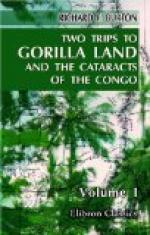Fortunately for me, as for herself, Loanda had got rid of Mr. Vredenburg’s predecessor, who soon followed the lamented Richard Brand, first British Consul, appointed in 1844. The “real whole-hearted Englishman” was after that modern type, of which La Grundy so highly approves. An honest man, who does not hold to the British idea that “getting on in the world” is Nature’s first law, would be sorely puzzled by such a career.
The day after my arrival was the festival which gives to Sao Paulo de Loanda its ecclesiastical name “da Assumpcao.” The ceremonies of the day were duly set forth in the Boletim Official do Governo Geral da Provincia de Angola. A military salute and peals of bells aroused us at dawn; followed a review of the troops, white and black; and a devout procession, flags flying and bands playing, paced through the chief streets to the Cathedral. A visit of ceremony in uniform to the Governor-General, Captain Jose Baptista de Andrade, a historic name in Angola, led to an invitation for the evening, a pleasant soiree of both sexes. The reception was cordial: whatever be the grievances of statesmen and historians, lawyers and slave-mongers, Portuguese officers are always most friendly to their English brethren. The large and airy rooms were hung with portraits of the several dignitaries, and there was an Old World look about Government House, like the Paco at Pangim (Goa). Fifty years ago colonial society was almost entirely masculine; if you ever met a white woman it was in a well-curtained manchila surrounded by “mucambas” or “mucacamas, negro waiting maids:” as the old missioner tells us, “when they go abroad, which is seldom, they are carried in a covered net with attendance of captives.” All this is changed, except as regards leaving the house, which is never done during the day: constitutionals are not wanted in the tropics, and the negroes everywhere make the streets unfit, except for any but the very strongest-minded of the weaker sex. The evenings at Government House are passed with music and dancing, and petits jeux innocents for the juniors, whilst the seniors talk and play voltarete till midnight. I well remember one charming face, but I fear to talk about it—ten years in Africa cannot pass without the saddest changes.
With an eye to future exploration, I was anxious to see something of the style of travel in Angola, and to prospect the proposed line of railway intended to checkmate the bar of the river Cuanza. The Cassange (Kasanji) war on the eastern frontier had just ended honourably to Portuguese arms, but it proved costly; the rich traffic of the interior had fallen off, and the well-known Feira was sending down its fairings to independent Kinsembo. Moreover, in order to raise funds for the rail, the local Government talked of granting the land to an English company for growing the highly prized gossypium arboreum.




